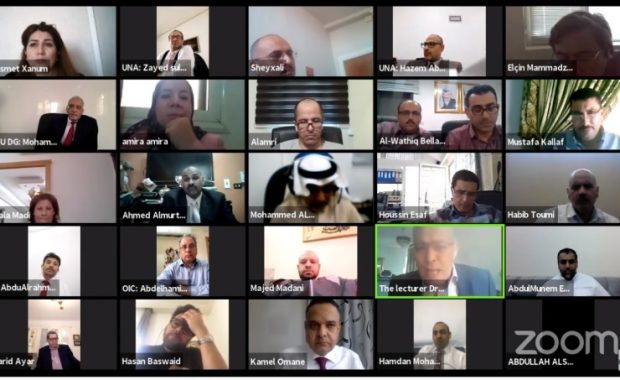
UNA workshop focuses on vetting news during crises, COVID-19 rumors

JEDDAH: Journalists from 11 Asian countries were among the more than 170 media professionals from 33 countries who took part in a virtual workshop held by the Union of Organization of Islamic Cooperation News Agencies (UNA) on “Methods for vetting news during crises and spread of rumors (COVID-19)”.
In the workshop, Dr Sadok Hammami, Associate Professor, Institute of Press and Information Sciences, University of Manouba, Tunisia, delivered a lecture that focused on the conditions that allow the emergence and spread of false news, misleading information and rumors as well as on the tools that fake news makers and photo manipulators use to mislead public opinion.
He stressed that media professionals should not be mere carriers of information but should also act as determined investigators who scrutinize the information they receive before they draft their reports and present them through their media to the public.
Journalism is a profession based on investigation and a journalist should pass on only the information that he or she has reviewed carefully, he added.
Dr Hammami insisted on professional and ethical media as the alternative for the false news and the press reports produced by journalists should always be a good source of reliable information.
Strong commitment to facts and to the truth has prompted some well-established media institutions to set up specialized departments to verify the information and check the details presented by their own journalists based on an in-house methodology that ensures accuracy at all times, Dr Hammami said.
He added that during crises, the media play a crucial role in spreading awareness and in providing clarifications taken from reliable and knowledgeable sources.
“The media has a crucial role in verifying all the facts and checking all details before conveying them to the general public,” Dr Hammami said.
He shared with the participants online links to check the veracity of claims, pictures and videos and urged all media professionals to use them in order to make sure they do not fall prey to baseless allegations and rumors and to write or speak only about facts.
The workshop was the first of series of events that UNA is planning to hold in Arabic, French and English to develop the skills of the media professionals on methods to verify information and news on how to deal with open-source information during crises and pandemics, especially the coronavirus pandemic.
The participants were from Saudi Arabia, Jordan, UAE, Morocco, Somalia, Azerbaijan, Egypt, Nigeria, Poland, Malaysia, Senegal, Tunisia, Britain, Bahrain, Algeria, Mauritania, Lebanon, Palestine, Cote d’Ivoire, Kuwait, Oman, Turkey, Sudan, Philippines, Iraq, Pakistan, Gambia, and Sierra Leone.


